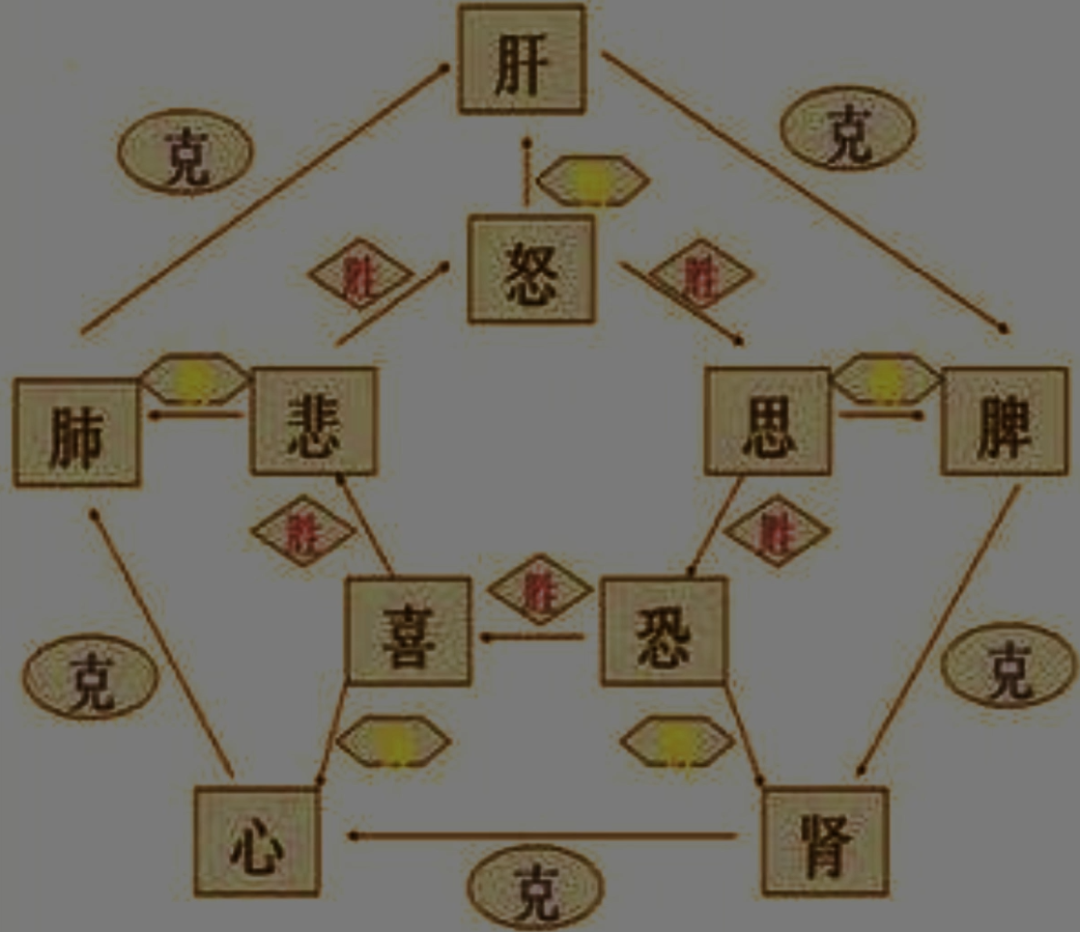Source: NSBL
Everyone experiences the seven emotions and six desires throughout their lives. The body is often subtly influenced by emotions; with careful observation, one can see numerous instances where emotions affect health. For example, when a person is nervous, some may experience sweaty palms, others may frequently need to use the restroom, and some may suffer from headaches. When burdened with worries, one may lose their appetite. Physicians advise patients with hypertension to avoid anger, as it can easily lead to “bursting blood vessels,” among other issues. Importantly, emotions can leave both positive and negative traces on the five organs through the endocrine system. Positive traces promote health and delay aging, while negative traces accelerate aging and harm health.
 Traditional Chinese Medicine (TCM) believes that there are two main factors that lead to illness: external and internal. The external factors are the six excesses (liuxin) (wind, cold, dampness, dryness, heat, and fire), which are significant external causes of disease, referred to as external pathogens. The internal factors are the seven emotions (qiqing) (joy, anger, worry, thought, sadness, fear, and shock), which are significant internal causes of disease, referred to as emotional disturbances. Emotional disturbances are more significant than external factors in causing disease. The relationship between emotions and the organs is that “the seven emotions arise from the five organs and can harm the five organs.” The physiological activities of the organs must rely on qi and blood as their material basis, while mental activities are expressed through the physiological functions of the organs. Therefore, emotional activities are closely related to the qi and blood of the body’s organs. Thus, it is said: “When blood is abundant, there is anger; when blood is insufficient, there is fear.” Under normal circumstances, the seven emotions do not lead to pathological changes, but if emotions are excessive, they can cause imbalances in yin and yang, disrupt qi and blood, and harm the five organs, leading to disease. As stated in the “Nourishing Life and Extending Life Record”, “Spring anger is unpredictable; excessive anger is harmful”; and in the “Three Causes and One Disease Theory”, it is said, “Emotions are the source of all diseases in the human body.” The six excesses invade the body from the mouth, nose, or skin, referred to as external invasion, and in the early stages of illness, there are often exterior symptoms. With proper prevention, they will not harm the organs. In contrast, changes in the seven emotions affect the circulation of qi and blood, referred to as internal injury, which can cause blockages in the meridians, qi stagnation, and insufficient righteous qi, leading to imbalances in the yin, yang, qi, and blood of the internal organs, resulting in disease, until the organs are harmed. Therefore, the seven emotions play a significant role in triggering diseases, promoting recovery, and even causing deterioration or death. The “Three Causes and One Disease Theory” by Chen Wuze from the Song Dynasty marks the maturation of the theory of the seven emotions. The “Three Causes and One Disease Theory: Discussion on the Seven Emotions” states: “Joy harms the heart, anger harms the liver, worry harms the lungs, thought harms the spleen, sadness harms the heart protector, shock harms the gallbladder, and fear harms the kidneys.”
Traditional Chinese Medicine (TCM) believes that there are two main factors that lead to illness: external and internal. The external factors are the six excesses (liuxin) (wind, cold, dampness, dryness, heat, and fire), which are significant external causes of disease, referred to as external pathogens. The internal factors are the seven emotions (qiqing) (joy, anger, worry, thought, sadness, fear, and shock), which are significant internal causes of disease, referred to as emotional disturbances. Emotional disturbances are more significant than external factors in causing disease. The relationship between emotions and the organs is that “the seven emotions arise from the five organs and can harm the five organs.” The physiological activities of the organs must rely on qi and blood as their material basis, while mental activities are expressed through the physiological functions of the organs. Therefore, emotional activities are closely related to the qi and blood of the body’s organs. Thus, it is said: “When blood is abundant, there is anger; when blood is insufficient, there is fear.” Under normal circumstances, the seven emotions do not lead to pathological changes, but if emotions are excessive, they can cause imbalances in yin and yang, disrupt qi and blood, and harm the five organs, leading to disease. As stated in the “Nourishing Life and Extending Life Record”, “Spring anger is unpredictable; excessive anger is harmful”; and in the “Three Causes and One Disease Theory”, it is said, “Emotions are the source of all diseases in the human body.” The six excesses invade the body from the mouth, nose, or skin, referred to as external invasion, and in the early stages of illness, there are often exterior symptoms. With proper prevention, they will not harm the organs. In contrast, changes in the seven emotions affect the circulation of qi and blood, referred to as internal injury, which can cause blockages in the meridians, qi stagnation, and insufficient righteous qi, leading to imbalances in the yin, yang, qi, and blood of the internal organs, resulting in disease, until the organs are harmed. Therefore, the seven emotions play a significant role in triggering diseases, promoting recovery, and even causing deterioration or death. The “Three Causes and One Disease Theory” by Chen Wuze from the Song Dynasty marks the maturation of the theory of the seven emotions. The “Three Causes and One Disease Theory: Discussion on the Seven Emotions” states: “Joy harms the heart, anger harms the liver, worry harms the lungs, thought harms the spleen, sadness harms the heart protector, shock harms the gallbladder, and fear harms the kidneys.”

Joy Harms the Heart In spring, joy can harm the heart. Moderate joy and laughter can help to smooth the flow of qi and blood, alleviate mental tension, and promote health. The heart houses the spirit, and excessive joy can scatter qi and harm the heart. Therefore, extreme joy can easily harm the heart, leading to confusion of thought and mental disturbances, which can trigger diseases such as hypertension and heart disease. A classic example is Fan Jin, who became mad due to excessive joy after passing the imperial examination. This is a typical case of joy harming the heart.Anger Harms the Liver Anger harms the liver. Anger causes qi to rise, and excessive anger can lead to the upward reversal of liver qi, depleting the liver’s yin and blood, which can result in symptoms such as vomiting blood, fainting, sudden blindness, or even death, as hypertension can lead to a stroke due to anger. People with bad tempers often have liver qi stagnation. “Medical Records of the Occasional Physician” states: “When anger is released, the liver blood is greatly harmed; when anger is suppressed, the liver blood is also adversely affected. Anger is the thief of blood.” In the “Legend of Yue Fei”, there is a story where Niu Gao captured Jin Wuzhu, and while riding on his back, he laughed excessively, which harmed his heart qi, resulting in his death from laughter; Jin Wuzhu, filled with hatred and anger, died from rage. This is a classic example of how extreme emotional activity can lead to death.Worry Harms the Lungs Worry harms the lungs. Worry can cause lung qi stagnation, leading to symptoms such as chest tightness, shortness of breath, coughing, and a weak voice. In “Dream of the Red Chamber”, Lin Daiyu is a typical example of someone who is overly sentimental; she becomes melancholic upon seeing the moon wane and flowers wither, often crying and damaging her lung qi, ultimately leading to her premature death from pulmonary tuberculosis. Modern medicine has confirmed that depression is comorbid with breast cancer and prostate cancer.Thought Harms the Spleen Thought harms the spleen. “Medical Treatise, Volume Seven” states: “Excessive thinking leads to qi stagnation, which harms the spleen.” Overthinking can exhaust the spleen’s ability to transport and transform, leading to qi stagnation and harming the spirit and spleen. Symptoms may include fatigue, poor appetite, abdominal distension, loose stools, palpitations, insomnia, forgetfulness, and vivid dreams.Sadness Harms the Heart Protector “Medical Principles of the Pure and Simple” states: “Sadness causes qi to reverse, leading to stagnation, which harms the lungs over time.” Excessive sadness, heavy-heartedness, and gloom can dissipate lung qi, resulting in symptoms such as excessive weeping, sighing, pale complexion, fatigue, chest tightness, and shortness of breath.Fear Harms the Kidneys Fear harms the kidneys, as it causes qi to be timid. “The Yellow Emperor’s Classic of Internal Medicine” states: “Fear causes essence to retreat.” The kidneys store essence, and excessive fear can deplete kidney essence, leading to symptoms such as pale complexion, dizziness, unstable kidney qi, nocturnal emissions, rectal prolapse, and even causing paralysis, incontinence, and tremors.Shock Harms the Heart and Gallbladder Shock harms the heart and gallbladder. “Three Causes and One Disease Theory, Volume Seven” states: “Shock harms the gallbladder, causing the spirit to have no place to return, and the mind to be unsettled, leading to confusion.” “Jisheng Fang: On Palpitations and Forgetfulness” states: “Palpitations are caused by a weak heart and a timid gallbladder.” Sudden fright can disrupt heart qi, leading to symptoms such as palpitations, confusion, restlessness, blank stares, insomnia, and mental disorders; in severe cases, it can even lead to death from shock. Although emotional disturbances can selectively harm certain organs, it is incorrect to mechanically assume that anger only harms the liver, joy only harms the heart, and so on. The human body is an organic whole, and emotional activities are complex and variable. Sometimes, excessive emotional activity can harm multiple organs, and sometimes several emotional disturbances can simultaneously harm one organ. The seven emotions often primarily affect the heart, liver, and spleen, with a greater impact on the heart. Thus, “The Spiritual Pivot: Questions on the Mouth” states: “The heart is the master of the five organs and six bowels… Therefore, sadness, worry, and sorrow can move the heart, and when the heart moves, all the five organs and six bowels are shaken.” This indicates that various emotional stimuli are related to the heart, and damage to the heart spirit can also affect other organs. For example, liver stagnation can lead to spleen and stomach issues, resulting in disharmony between the liver and spleen, and liver fire can invade the lungs. Emotional fluctuations are most pronounced when righteous qi (yang qi) is insufficient and pathogenic qi is rising. Those with sufficient righteous qi are optimistic and open-minded; those with insufficient righteous qi are pessimistic and despairing. Therefore, by uplifting righteous qi, a person’s mental state can greatly improve, and diseases caused by the seven emotions will stay away from us. Insufficient righteous qi primarily stems from various pressures related to physical health, diet, lifestyle habits, interpersonal relationships, and emotions. Numerous facts have proven that managing emotions well, reducing anger and frustration, can enhance yang qi (righteous qi), leading to fewer illnesses. This entirely depends on how one manages their emotions; a good mental state is something one must create for themselves.

